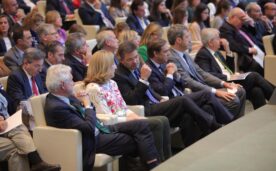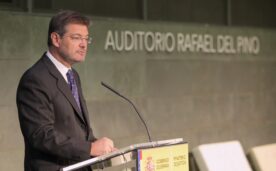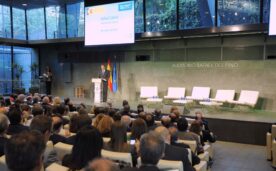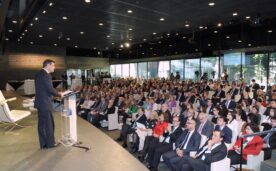Rafael del Pino Foundation and the Ministry of Justice
Summary:
<strong>Towards a 21st Century Justice: digital, open, innovative and efficient (8 October 2015)</strong> Rafael Catalá, Minister of Justice "The functioning of our Administration of Justice will be digital or it will not be". This was the clear statement made by the Minister of Justice, Rafael Catalá, during his speech at the opening of the forum "Towards a 21st century Justice: digital, open, innovative and efficient", held at the Rafael del Pino Foundation on 8 October. Catalá recalled that 21st century transactions are based on technological means and that this is also happening in public administration. According to him, it is estimated that, by 2025, 75% of the Spanish population will be digital natives, that is, they will use technology on a regular basis for their personal relations and with the Administration. For this reason, it is necessary to carry out the digital transformation of public administrations. In this context, he stressed, Justice cannot take a different path. The modernisation of Justice, which implies proximity, agility and simplicity, must follow the path of technological innovation, but this requires technical means. To begin to address this shortcoming, the 2016 budget doubles the amount allocated for this purpose in the 2014 budget, which represents an effort and a commitment to modernisation, bearing in mind that this increase is taking place at a time of significant austerity. Along with this, the Ministry is implementing a series of initiatives to promote technological modernisation, among which Catalá highlighted the obligation of electronic communication for new procedures, the progressive implementation of the electronic judicial file, the promotion of interoperability between the management systems of the different administrations, the validity of communications on mobile devices, the electronic judicial headquarters (a window for the operation of judicial processes that allows their status to be consulted), electronic judicial auctions, the judicial office as a new organisational model and the transformation of the civil registry into a modern and efficient one, starting with the registration of births and deaths from public health centres, or the telematic application for nationality. The first step towards digital justice: paper 0 The round table on the move towards digital justice began with the intervention of Enric Colet, Secretary General of the Ministry of Justice of the Generalitat de Catalunya, who stressed that modernisation requires collaborative work with a large group of agents. Drawing on Catalonia's experience in the digitisation of justice, Colet pointed out that in order for the process of modernising justice to be successful, it must be removed from the political debate. Colet also warned that the problem is not basically technological, but rather one of how technologies are used in the Administration of Justice, of changes in the way of working, organisation and human resources. In relation to the external companies that collaborate in the project, Colet advised that the Administration should never lose leadership of the project. And with regard to staff training, he recommended that it should not be done with external companies, but with professionals from the Justice Administration itself, who know the processes and needs. This is key to making rapid progress in digitisation. For his part, José Ramón Navarro, president of the National Court, which has been immersed in the digitisation process for some time, stressed that the important thing for success in the process is change management. Navarro also said that the Audiencia Nacional should be the model for the rest of the Justice Administration because it has something fundamental: a social table in which everyone collaborates in the management of change. According to Navarro, the advantages of digitalisation are the possibility of having a document map and a procedural manager, procedural security with digital signatures and efficient management of the archiving of physical documents that may be necessary in the processes. In turn, the main complication of the process would be the assembly of professionals (solicitors and lawyers). Antonio Dorado, Secretary General of the Administration of Justice, explained that the establishment of a date (1 January 2016) for the entry into force of the electronic process management system is due to the deadlines established by Law 18 of 2011 and that if no date were set, no change would take place and the Administration of Justice would continue to work with paper. In this regard, he recalled that a procedure with paper costs the Administration 80 euros and without it only 5 euros, in addition to the time saved by the use of the electronic management system. The president of the National Association of Solicitors, Juan Carlos Estévez, pointed out that all these professionals have had their offices digitised for some time and highlighted the exponential growth in the number of telematic notifications as an achievement. The main problem he encounters is that some autonomous regions have different management and processing programmes. Finally, Borja Adsuara, an expert in Digital Law, placed special emphasis on the importance of knowledge management, both legal and on artificial intelligence applied to the resolution of cases, because a large part of the procedures can be automated. And he predicted that we will see this in a few years' time. Challenges of the future: Citizens, open and transparent justice The second round table focused on the challenges of the future. The first to speak was José María de Santiago, Vice President of GARTNER, who referred to the trends that are converging in the digital transformation and that are accelerating its speed. These are the analysis of big data, making information available to all actors in mobility, sharing information efficiently in the cloud and being able to access it from any place and any device, the security of this information, the internet of things and artificial intelligence as an ideal complement to human intervention in the Administration of Justice. He also stressed that there are three key factors for success in the digitisation process: the renewal or adaptation of existing systems, the establishment of digital leadership so that everyone believes in the change and trying to remove the fear of digitisation in relation to the loss of employment, skills, etc. Óscar Cortés, advisor to the Minister of Justice on Innovation and Digital Transformation, pointed out the need for a public service such as Justice to understand what 21st century citizens are like, because the role of citizens has changed thanks to information and communication technologies. This means they have more power. Moreover, they want more accessibility to what is in Justice. Therefore, it is necessary to evolve from a very legal-centred justice system to one that is more citizen-centred. The president of Transparency International Spain, Jesús Lizcano, said that justice in Spain tends to be relatively poorly valued. Victoria Cinto, magistrate and member of the General Council of the Judiciary's New Technologies Committee, emphasised that citizens have the right to a transparent justice system, to know how it works in relation to, for example, the length of proceedings, what to expect, etc. He also insisted that judges have been prepared for digitalisation for some time and that what they need is the technical means. José María de Santiago. Vice-president GARTNER Victoria Cinto. Magistrate and Member for New Technologies, General Council of the Judiciary Jesús Lizcano. President, Transparency International Spain Oscar Cortés. Advisor to the Minister of Justice on Innovation and Digital Transformation, Ministry of Justice. Sergio Martín. Director, TVE24h (moderator) <em>This document summarises what was discussed during the meeting held for this purpose at the Foundation. The Rafael del Pino Foundation is not responsible for the comments, opinions or statements made by the people who participate in its activities and which are expressed as a result of their inalienable right to freedom of expression and under their sole responsibility. </em>
The Rafael del Pino Foundation is not responsible for the comments, opinions or statements made by the people who participate in its activities and which are expressed as a result of their inalienable right to freedom of expression and under their sole responsibility. The contents included in the summary of this conference are the result of the debates held at the meeting held for this purpose at the Foundation and are the responsibility of their authors.
The Rafael del Pino Foundation is not responsible for any comments, opinions or statements made by third parties. In this respect, the FRP is not obliged to monitor the views expressed by such third parties who participate in its activities and which are expressed as a result of their inalienable right to freedom of expression and under their own responsibility. The contents included in the summary of this conference are the result of the discussions that took place during the conference organised for this purpose at the Foundation and are the sole responsibility of its authors.






